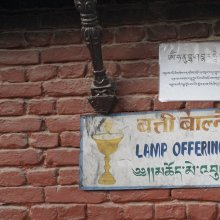Ghara: 17 definitions
Introduction:
Ghara means something in Hinduism, Sanskrit, Buddhism, Pali, Marathi, Jainism, Prakrit, Hindi. If you want to know the exact meaning, history, etymology or English translation of this term then check out the descriptions on this page. Add your comment or reference to a book if you want to contribute to this summary article.
Images (photo gallery)
In Hinduism
Shaktism (Shakta philosophy)
Source: Google Books: ManthanabhairavatantramGhara (घर) (Cf. Gṛha, Veśman) refers to “houses”, according to the Manthānabhairavatantra, a vast sprawling work that belongs to a corpus of Tantric texts concerned with the worship of the goddess Kubjikā.—Peregrination to the sacred places is variously termed. It may be simply called a ‘wandering’ (aṭana, bhramaṇa). This may be associated with the pious wandering of the ascetic in search of alms (bhikṣāṭana) and, especially, begging for alms in the eight sacred Kaula places listed below. Accordingly, these places are called ‘sacred seats of peregrination' (aṭanapīṭha). They are the residences of goddesses, accomplished adepts and Tantric partners who are represented as low-caste women or close female relatives. From this point of view they are called ‘houses’ (gṛha, ghara, veśman).

Shakta (शाक्त, śākta) or Shaktism (śāktism) represents a tradition of Hinduism where the Goddess (Devi) is revered and worshipped. Shakta literature includes a range of scriptures, including various Agamas and Tantras, although its roots may be traced back to the Vedas.
Shaivism (Shaiva philosophy)
Source: Brill: Śaivism and the Tantric TraditionsGhara (घर) refers to the “lodge” (of the initiate), according to the Mālinīvijayottaratantra, chapter 18 (“appropriate conduct of the accomplished Yogin”) verses 18.74-81 (as quoted in the Tantrāloka verse 4.213-221ab).—Accordingly, “[...] And as regards the performance or non-performance of vows, etc., and entrance into sacred places, etc. [i.e., kṣetras, pīṭhas, and upapīṭhas], the observance of rules of action, and (those rules associated with) initiatory name, initiatory lineage, or the like [i.e., according to the lodge (ghara) and the like of the initiate], whether the form, sectarian marks, and so on be one’s own or another’s—nothing is prescribed here regarding these, nor, contrariwise, prohibited. [...]”.

Shaiva (शैव, śaiva) or Shaivism (śaivism) represents a tradition of Hinduism worshiping Shiva as the supreme being. Closely related to Shaktism, Shaiva literature includes a range of scriptures, including Tantras, while the root of this tradition may be traced back to the ancient Vedas.
Languages of India and abroad
Pali-English dictionary
Source: BuddhaSasana: Concise Pali-English Dictionaryghara : (nt.) house.
Source: Sutta: The Pali Text Society's Pali-English Dictionary1) Ghara, 2 (a drink (cp. gala) & garala poison) (°-); in —°dinnakābādha sickness in consequence of a poisonous drink (expl. as suffering fr. the results of sorcery) Vin.I, 206 (cp. Vin. Texts II.60); —visa poison Pug.48; DhA.II, 38; —sappa a poisonous snake DhA.II, 256. (Page 257)
2) Ghara, 1 (nt.; pl. °ā Dh.241, 302) (cp. gaha & geha) a house A.II, 68; Sn.43 (gahaṭṭhā gharaṃ āvasantā), 337 (Abl. gharā), 889 (id. gharamhā); J.I, 290 (id. gharato); IV, 2, 364, 492 (ayo°); Pug.57; Miln.47. combined with vatthu PvA.3, 17.—sūcighara a needle-case VvA.251.

Pali is the language of the Tipiṭaka, which is the sacred canon of Theravāda Buddhism and contains much of the Buddha’s speech. Closeley related to Sanskrit, both languages are used interchangeably between religions.
Marathi-English dictionary
Source: DDSA: The Molesworth Marathi and English Dictionaryghara (घर).—n (gṛha S) A house, edifice, mansion, any habitation. 2 A household. 3 Domestic or social life; as contrad. from retirement. Ex. ajaparyanta tō saṃsārānta vāgata hōtā paṇa ātāṃ ghara sōḍilēṃ. 4 An association, a society or company, a house of agency. 5 A den, nest, hole, cell, burrow (of a beast, bird, rat). 6 A hole or cavity as a recep- tacle or as a place of lodgement. Ex. bhintīsa gharēṃ pāḍūna khuṇṭī māra; pāyānta kāṇṭyānnī mōḍūna gharēṃ kēlīṃ. 7 A receptacle gen.; a frame, stand, cup, pan, socket, groove, channel. 8 A division or compartment; a drawer, till, partition, pigeon-hole. 9 A square or cell (of a chess-board, almanac &c.) 10 Astrologically considered. The station of the sun or a planet. 11 Family of ancestors, race, lineage. 12 Quarter, region, station, seat (of wind, rain &c.; of an affection, faculty, humor, malady). 13 Source, spring, seat, mine, root, parent, place of inherence or production, lit. fig. Ex. vāṅgēṃ kharajācēṃ ghara āhē; āḷasa dāridryācēṃ ghara; kōṅkaṇa hēṃ nāraḷācēṃ ghara. 14 Ground, basis, footing (of an argument &c.) 15 In music. The compass, reach, sphere (of a note or tone); the key. 16 The keys of a musical instrument. 17 Means, resources, powers of accomplishing. Ex. jēṃ kāṃhīṃ karaṇēṃ tēṃ āpalēṃ ghara pāhūna karāvēṃ. 18 A single division or space as defined by the bracing cords (of a tabor or drum). 19 The art, secret, mystery, key; the commanding or all-comprehending point (of a science &c.) Ex. guṇākāra bhāgākara hē hiśēbācēṃ ghara; tumhī gātāṃ kharēṃ parantu tumacyā hātīṃ gāṇyācēṃ ghara lāgalēṃ nāhīṃ. 20 A hold or point reserved to stand by. Ex. hyācē bōlaṇyānta ghara āhē; hā ghara ṭhēūna bōlatō. 21 Home, self, one's own person. Pr. icchī parā yēī gharā Evil wished for another is fallen on self. ghara ughaḍaṇēṃ (To open a house unto.) To give a wife unto: also to take a wife or to get offspring. ghara karaṇēṃ To set up or keep house; to get an establishment. 2 To enter and fix one's self; to make lodgement. ghara ghālaṇēṃ g. of o. To ruin the house of. ghara ghēṇēṃ g. of o. To spoil, strip, fleece, to plunder utterly. 2 To ruin. 3 To take up a lodgement in. ghara cālaviṇēṃ To manage domestic affairs. Pr. ghara cālavitō tō gharacā vairī. ghara jōḍaṇēṃ To form union or alliance with (other families, tribes &c.) ghara ḍōī- vara ghēṇēṃ To make an outrageous uproar; to turn the house out of windows. ghara tuṭaṇēṃ To be ruptured or dissolved--friendly connection. ghara dākhaviṇēṃ (dusa- ṛyācēṃ) To turn adrift; to discard and put out (a dependent &c.) ghara dharaṇēṃ To keep at home; to remain quiet and patient:--opp. to absconding or fleeing (during any trouble or tumult). 2 To obtain firm hold, seat, lodgement--a disease &c. ghara dhuṇēṃ To consume, devour, dissipate (the whole property of another). 2 To fleece, strip, spoil utterly. ghara nā dāra āṇi dēvaḷīṃ biṛhāḍa Used of a vagrant without house or hovel: also of one free from the encumbrance of wife and family. ghara nighaṇēṃ g. of o. To leave her husband and dwell with another--a wife; or, generally, to depart into the house and family of. ghara nēsaviṇēṃ To cover in a house; to clothe with thatch. ghara phōḍaṇēṃ To break up a household. ghara basaṇēṃ To sink or be reduced--a family from misfortunes. ghara pāhaṇēṃ To obtain footing or entrance within the house of;--used of Death or some disaster. Pr. mhātārī mēlyācēṃ duḥkha nāhīṃ paṇa kāḷa ghara pāhatō. ghara phiralēṃ mhaṇajē gharācē vāṃsē phiratāta When our patron turns against us, all his minions turn with him. ghara buḍaṇēṃ To be ruined or become extinct--a family or company. ghara bhaṅgaṇēṃ To break or fail--a family or company. ghara bharaṇēṃ To enrich one's self, esp. by impoverishing or disregarding others. ghara bhalēṃ kīṃ āpaṇa bhalā A phrase used of one who intermeddles not with people's squabbles or affairs, but diligently prosecutes his own business. ghara māṇḍaṇēṃ To set out or furnish and embellish a house. ghara māraṇēṃ To plunder a house. ghara mhaṇūna ṭhēvaṇēṃ To keep a stock of as a reserve or stand by. ghara righaṇēṃ g. of o. See ghara nighaṇēṃ. Ex. ghara righē jāī uṭhōni bāhēri ||. ghara lāgaṇēṃ Said of a household upon the death of the mistress or the only son. ghara vasaviṇēṃ To build up a house, or rear a family. Said of a female allusively to her marriage. See Ruth iv. 11. ghara sāṅkaḍa āṇi bāīla mākaḍa In a dirty hovel with an ugly wife you are secure (for no body will covet your possession). gharācā pāyaguṇa tasā & gharācī khuṇṭīca tasī Phrases expressive of the prevalence, among the members of a family, of a vice, fault, ill habit or practice. gharācā vāṃsā ōḍhaṇēṃ To pull out the linchpin of a business; to withdraw something without which a business is stopped or ruined. gharānta or gharīṃ (In the house.) The covert and polite phrase used by the husband in speaking of his wife. Correl. with bāhēra q. v. Ex. tumhāsa padārtha dilhā tara gharānta manāsa yēṇāra nāhīṃ; mī bāhēra rāhilōṃ tara gharānta rāga yēīla. gharānta samajaṇēṃ To settle a dispute at home or amongst one's own. gharāvara kāṇṭyā ghālaṇēṃ or gōṃvarī ṭhēvaṇēṃ or nikhārā ṭhēvaṇēṃ To bring ruin or public odium upon a family. gharāvara kutrēṃ caḍhaviṇēṃ To set people by the ears. gharāvara gavata rujaṇēṃ To become desolate--a house. gharāsa kāṇṭī lāvaṇēṃ To stop a house with thorn-bushes, viz. to make desolate, destroy, ruin. Also -lāgaṇēṃ To be left desolate. gharāsa hāḍa bāndhaṇēṃ or gharāvara ṭāhaḷā ṭākaṇēṃ To hang a bone to a man's house; or to throw a sprig or leafy branch over it. Indications of his being ejected from caste. gharāsārakhā pāhuṇā hōtō pāhuṇyāsārakhēṃ ghara hōta nāhīṃ One must conform to the multitude, not the multitude to one. gharīṃ karaṇēṃ To keep (an estate or a farm--śēta, jamīna, maḷā, bāga &c.) under one's own hand. gharīṃ dārīṃ sārakhā The same abroad and at home. (Reproachfully.) gharīṃ basaṇēṃ (To sit at home.) To be without employment. gharīṃ yēṇēṃ (To return home--females.) To be widowed and thus lose their husband's house. gharōgharīṃ ēkaca parī or gharōghara mātīcyāca culī Every one whosoever has his infirmities, afflictions &c. āpaghara kīṃ bāpaghara & dilhēṃ ghara kīṃ upajalēṃ ghara Phrases expressive of the helplessness of woman; she has no home but the house of her husband or that of her parents. āpalēṃ ghara bārā kōśāvarūna disatēṃ Every one well understands his own matters. ālyā gharacā Of the former house (i. e. husband);--used of the former offspring of a widow remarried. khālyā gharacē vāṃsē mōjaṇēṃ To seek the evil of a benefactor. baḍā ghara pōkaḷa vāṃsā (Half Hindustani, half Maraṭhi.) Great cry and little wool; much display but no substance.
--- OR ---
gharā (घरा).—m (ghara) A little hole or cavity (as formed in the flesh by a thorn, left by a boil &c.) in which a thing might lodge.
--- OR ---
ghāra (घार).—f (gṛdhra S) A kite, Milvus Govinda. Sykes. 2 A paper-kite of the form and semblance of the bird. ghārīsārikhī vāṭa pāhaṇēṃ (To watch for like a kite.) To keep a good look out for.
--- OR ---
ghārā (घारा).—a Of the color of cats' eyes--eyes: and attrib. cat-eyed.
Source: DDSA: The Aryabhusan school dictionary, Marathi-Englishghara (घर).—n A house. A frame. A household. A compartment. Footing. A hole, den. Source. Domestic or social life.ghara karaṇēṃ To set up or keep house. To effect a lodgment. ghara ghēṇēṃ Spoil; ruin. Take up a lodgment in. ghara cālaviṇēṃ Manage do- mestic affairs. ghara jōḍaṇēṃ Form union with. ghara dharaṇēṃ Keep at home; obtain firm seat. ghara dhuṇēṃ Consume (the whole pro- perty of another). ghara dhuvūna nēṇēṃ To con- sume, devour the whole property of another. ghara phiralēṃ mhaṇajē gharācē vāṃsē phiratāta Calamities never come singly. In ad- versity even friends become foes. ghara phōḍaṇēṃ Break up a household. n Bur glary. ghara basaṇēṃ Sink a family from mis- fortunes. ghara buḍaṇēṃ Be ruined-a family. ghara bharaṇēṃ Enrich one's self by impover- ishing others.ghara māraṇēṃ Plunder a house. ghara mhaṇūna ṭhēvaṇēṃ Keep a stock of as a reserve. gharāta vājē nakāra ghaṇṭā To be extreme- ly indigent. gharāsa kāṇṭī lāvaṇēṃ Make de- solate, destroy. gharīṃ ālēlī A widowed girl or woman. gharīṃ dārīṃ sārakhā The same a broad and at home. gharīṃ basaṇēṃ Be with- out employment. gharōgharīṃ mātīcyā culī All are alike. khāllyā gharācē vāsē mōjaṇēṃ Seek the evil of a benefactor. baḍā ghara pōkaḷa vāṃsā Much display but no substance. Great cry and little wool.
--- OR ---
gharā (घरा).—m A little hole or cavity in which a thing might lodge.
--- OR ---
ghāra (घार).—f A kite. ghārīsārakhī vā़ṭa pāhaṇēṃ (To watch for like a kite.) To keep a good look out for.
--- OR ---
ghārā (घारा).—a Of the colour of cats' eyes–eyes.
Marathi is an Indo-European language having over 70 million native speakers people in (predominantly) Maharashtra India. Marathi, like many other Indo-Aryan languages, evolved from early forms of Prakrit, which itself is a subset of Sanskrit, one of the most ancient languages of the world.
Sanskrit dictionary
Source: DDSA: The practical Sanskrit-English dictionaryGhara (घर).—A house.
Derivable forms: gharaḥ (घरः).
--- OR ---
Ghāra (घार).—See under घ (gha).
Derivable forms: ghāraḥ (घारः).
--- OR ---
Ghāra (घार).—[ghṛ-ghañ] Sprinkling, wetting.
Derivable forms: ghāraḥ (घारः).
Source: Cologne Digital Sanskrit Dictionaries: Edgerton Buddhist Hybrid Sanskrit DictionaryGhara (घर).—nt. (and m. ? = Pali nt., and according to Childers m.; AMg. m. and nt.; Sanskrit gṛha), house: gharo, mss. (n. pl.; Senart em. gharā) Mahāvastu i.24.13; ghara-vāsa-rakṣito 285.22; gharaṃ, acc. sg. iii.289.8 (em.); gharam, n. sg. Mahāvyutpatti 5518.
--- OR ---
Gharā (घरा).—a high number: (Ārya-)Mañjuśrīmūlakalpa 343.25 (= 10 pragharā, q.v.; see aśeṣa).
Source: Cologne Digital Sanskrit Dictionaries: Shabda-Sagara Sanskrit-English DictionaryGhāra (घार).—m.
(-raḥ) Sprinkling, wetting. E. ghṝ to sprinkle, and ghañ aff.
Source: Cologne Digital Sanskrit Dictionaries: Monier-Williams Sanskrit-English DictionaryGhāra (घार):—m. (√1. ghṛ) sprinkling, besprinkling, [cf. Lexicographers, esp. such as amarasiṃha, halāyudha, hemacandra, etc.]
Source: Cologne Digital Sanskrit Dictionaries: Yates Sanskrit-English DictionaryGhāra (घार):—(raḥ) 1. m. Sprinkling.
Source: DDSA: Paia-sadda-mahannavo; a comprehensive Prakrit Hindi dictionary (S)Ghāra (घार) in the Sanskrit language is related to the Prakrit word: Ghāra.
[Sanskrit to German]
Sanskrit, also spelled संस्कृतम् (saṃskṛtam), is an ancient language of India commonly seen as the grandmother of the Indo-European language family (even English!). Closely allied with Prakrit and Pali, Sanskrit is more exhaustive in both grammar and terms and has the most extensive collection of literature in the world, greatly surpassing its sister-languages Greek and Latin.
Hindi dictionary
Source: DDSA: A practical Hindi-English dictionaryGhara (घर) [Also spelled ghar]:—(nm) home; house, residence; apartment, room; compartment; native place, homeland; office (as [tāraghara, ḍākaghara]); square or cell (in a chess-board); —[gṛhasthī] household; family; —[ghara] each and every house; —[ghāṭa] hearth and home; ~[ghusanā/ghussū] one who always keeps within the bounds of the female apartment; an effeminate man; ~[jaṃvāī] one who lives with, and is subordinated to, one’s in-laws: ~[jota] self-cultivation, self-tillage; —[dvāra] household effects; home and hearth: —[pīche] per household; ~[bāra] househol d; ~[bārī] a householder, family-man; ~[vālā] husband, the master of the household; ~[vālī] wife, the mistress of the household;—[ābāda karanā] to marry/remarry; to build up a family; to enter or re-enter the householder’s stage; —[ujaḍanā] ruination of a household/family; the demise of one’s wife; —[karanā] to create a room for oneself; to build up a household; —[kā] a near one; one’s own, internal; •[acchā] well-to-do; —[kā āṃgana honā] a house to be completely razed; to suffer ruination; —[kā ujālā] beloved of the whole family; glamour of the family; —[kā kāṭane ko dauḍanā, —kā kāṭe khānā] the house to arouse a feeling of desolation and disgust; —[kā ghara] the entire family; —[kā cirāga] see —[kā ujālā; —kā jogī joganā āna gāṃva kā siddha] a prophet is not honoured in his own land; —[kā na ghāṭa kā] belonging neither here nor there; —[kā nāma ḍubonā] to bring disgrace to the fair name of the family; —[kā bhedī] one who knows the secrets of the house; •[laṃkā ḍhāe] traitors prove to be the worst enemies; —[kā marda/śera] a hero within one’s own fourwalls; household hero; —[kī ādhī bhalī bāhara sārī nāhiṃ] dry bread at home is more welcome than sweetmeat elsewhere; —[kī khetī] easily procurable, easy to procure; —[kī murgī dāla barābara] what is easy to procure, does not score; —[ke ghara rahanā] to be even in a bargain; —[calānā] to run a household; —[jamānā] to establish a household; —[dekha lenā] to get habituated; to become a habitual visitor, to make profitable visits; —[phuṃka tamāśā dekhanā] to ruin one’s household for the sake of an idle pleasure; —[phoḍanā] to spell internecine, quarrel in a household; —[bigāḍanā] to bring ruin on a household; —[baiṭhanā] to become a/(somebody’s) mistress; to be out of employment; the house to crash down; —[baiṭhe] without moving out; without a stroke of work; —[bharanā] to amass wealth; to achieve prosperity; —[bhāṃya-bhāṃya karanā] the house to be desolated; —[meṃ gaṃgā ānā] to achieve one’s purpose without a stroke of work; to gain divine visit without effort; —[meṃ ḍālanā] to take as a mistress; —[meṃ diyā jalā kara taba masjida meṃ diyā jalānā] self-insterest is the first law of nature; —[meṃ bhuṃjī-bhāṃga la honā] to carry off meat from the graves, to be as poor as the church mouse; —[meṃ sūta na kapāsa julāhe se laṭṭhama-laṭṭhā] count not your chickens till they are hatched; —[sira para uṭānā] to make a terrible noise or create a commotion; to kick up a row in the house; —[se pāṃva nikālanā] to transcend the bounds of one’s home; to undermine the honour of the family; —[se beghara karanā] to turn a householder into a homeless being
...
Prakrit-English dictionary
Source: DDSA: Paia-sadda-mahannavo; a comprehensive Prakrit Hindi dictionary1) Ghara (घर) in the Prakrit language is related to the Sanskrit word: Gṛha.
2) Ghāra (घार) also relates to the Sanskrit word: Ghāra.
Prakrit is an ancient language closely associated with both Pali and Sanskrit. Jain literature is often composed in this language or sub-dialects, such as the Agamas and their commentaries which are written in Ardhamagadhi and Maharashtri Prakrit. The earliest extant texts can be dated to as early as the 4th century BCE although core portions might be older.
Nepali dictionary
Source: unoes: Nepali-English Dictionary1) Ghara (घर):—n. 1. a house; residence; home; 2. compartment; division; square; section; 3. dwelling place; abode; 4. Astrol. sign of the zodiac; 5. household; 6. the husband's house;
2) Ghāra (घार):—n. beehive;
Nepali is the primary language of the Nepalese people counting almost 20 million native speakers. The country of Nepal is situated in the Himalaya mountain range to the north of India.
See also (Relevant definitions)
Starts with (+218): Ghara hoovinagida, Ghara hoovu gida, Ghara-garnu, Ghara-hoovu-gida, Ghara-huvu-gida, Ghara-kharca, Ghara-na-ghata, Ghara-phornu, Gharaamgana, Gharaangan, Gharaasami, Gharabaitha, Gharabanda, Gharabandhana, Gharabandi, Gharabara, Gharabaravihina, Gharabari, Gharabasalya, Gharabasha.
Ends with (+161): Abhighara, Adaghara, Adamsaghara, Aggabodhi Padhana Ghara, Aghara, Agle-ghara, Aina-ghara, Ajayabaghara, Alyagelyacem Ghara, Alyagelyacem-ghara, Andughara, Antaraghara, Antoghara, Arittha Thapita Ghara, Atghara, Atithighara, Ayoghara, Baghara, Balaghara, Balantaghara.
Full-text (+379): Praghara, Aghara, Abhighara, Ghari, Gharajira, Jitajagata, Gharam, Abhyagharam, Ghariya, Morangi Ghara, Gharteya, Gharadolya, Malakambari, Asesa, Gharela, Atapin, Gharuda, Ghartika, Gharika, Atayin.
Relevant text
Search found 21 books and stories containing Ghara, Gharā, Ghāra, Ghārā; (plurals include: Gharas, Gharās, Ghāras, Ghārās). You can also click to the full overview containing English textual excerpts. Below are direct links for the most relevant articles:
Mimamsa interpretation of Vedic Injunctions (Vidhi) (by Shreebas Debnath)
Dhammapada (Illustrated) (by Ven. Weagoda Sarada Maha Thero)
Verse 302 - The Story of the Monk from the Country of the Vajjis < [Chapter 21 - Pakiṇṇaka Vagga (Miscellaneous)]
Verse 241 - The Story of Kāludāyi < [Chapter 18 - Mala Vagga (Impurities)]
Maha Prajnaparamita Sastra (by Gelongma Karma Migme Chödrön)
Part 2 - The true nature of dharmas < [Chapter XXIX - The Virtue of Wisdom]
Chaitanya Bhagavata (by Bhumipati Dāsa)
Verse 3.4.463 < [Chapter 4 - Descriptions of Śrī Acyutānanda’s Pastimes and the Worship of Śrī Mādhavendra]
Verse 3.4.462 < [Chapter 4 - Descriptions of Śrī Acyutānanda’s Pastimes and the Worship of Śrī Mādhavendra]
Verse 2.5.11 < [Chapter 5 - Lord Nityānanda’s Vyāsa-pūjā Ceremony and His Darśana of the Lord’s Six-armed Form]
Śrī Kṛṣṇa-vijaya (by Śrī Gunaraja Khan)
Chapter 7 - The Brāhmanas' Wives Offer Prayers to Lord Kṛṣṇa (Mallāra-rāga)
Chapter 6 - Prayers by the Wives of Kāliya-nāga (Dhānasi-rāga)
Rig Veda (translation and commentary) (by H. H. Wilson)
Rig Veda 5.30.15 < [Sukta 30]





